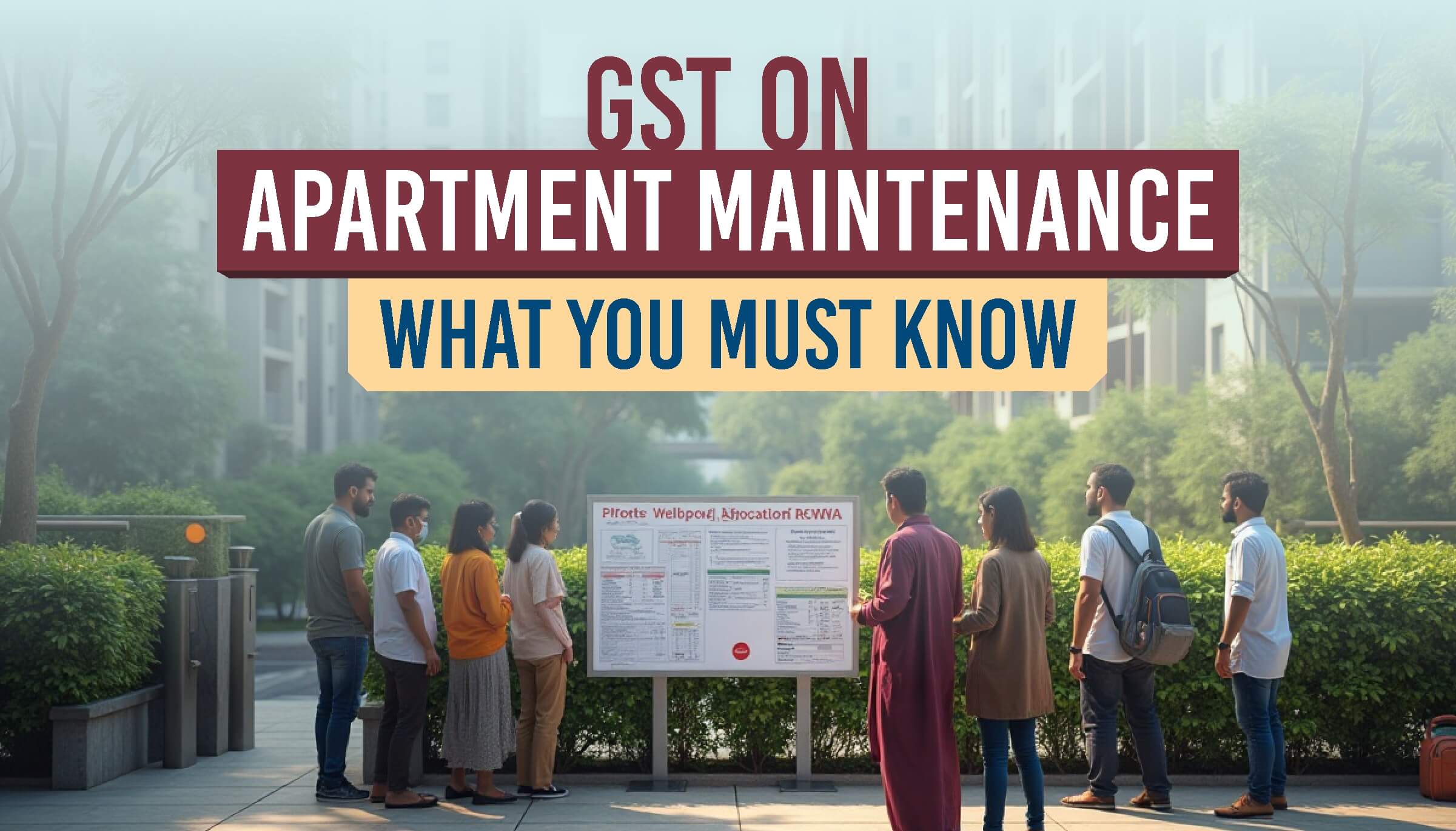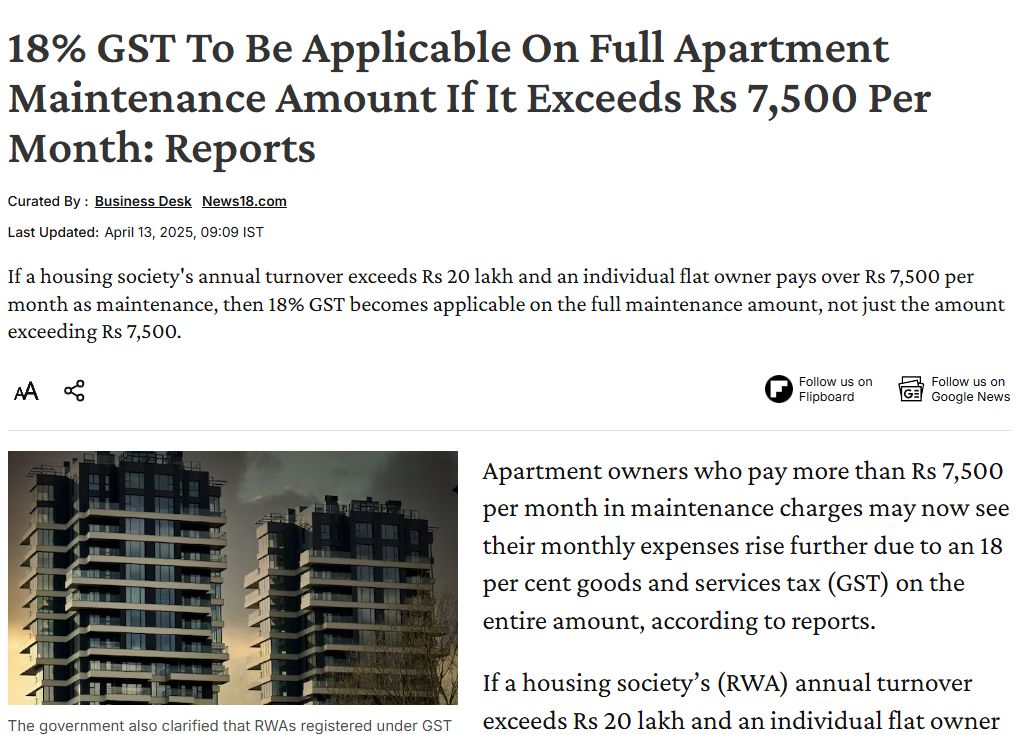
In early 2025, social media and residential WhatsApp groups in Karnataka exploded with confusion over notices being issued to Resident Welfare Associations (RWAs) regarding the applicability of 18% GST on apartment maintenance charges. Many residents panicked, believing that a new law had been introduced, demanding retroactive tax payments from societies and individual flat owners.
However, senior tax officials promptly issued clarifications: “There is no new law. The GST on apartment maintenance has existed since 2019. Only compliance efforts have been tightened.”
This clarification, while technically accurate, failed to calm the storm, because many RWAs and flat owners had either not heard of the rule or were misinformed about its scope. Some societies never registered under GST, assuming they were exempt. Others followed varied interpretations — leading to inconsistent practices even within the same city.
The situation in Karnataka is now emblematic of a larger national issue: a tax provision in place since 2019 that continues to be misunderstood, unevenly applied, and hotly debated.

Applicability Summary Table For GST on Apartment Maintenance News Causes Panic
The Legal Framework: Understanding GST on Apartment Maintenance Charges
The applicability of GST on apartment maintenance charges is governed by:
-
Notification No. 12/2017 – Central Tax (Rate) dated 28th June 2017 (Entry No. 77)
-
CBIC Circular No. 109/28/2019-GST dated 22nd July 2019
-
Case laws such as TVH Lumbini Square Owners Association vs. Union of India (Madras High Court, 2021)
-
Decisions by the Authority for Advance Rulings (AAR)
Basic Rule (As per CBIC Circular 2019):
GST at 18% is applicable only if:
-
Monthly maintenance charges exceed ₹7,500 per member (per flat), and
-
The aggregate turnover of the RWA exceeds ₹20 lakh in a financial year.
If both conditions are satisfied, GST is applicable on the entire amount, not just the excess. For example, if maintenance is ₹9,000/month, GST is payable on ₹9,000 — not on ₹1,500.
Historical Timeline of the Rule
2017 – GST Introduced:
The GST regime was launched in July 2017. Initially, residential maintenance charges collected by RWAs were presumed to fall under the exempted category, given their non-commercial nature.
July 2019 – CBIC Circular 109/28/2019-GST:
This circular clarified that:
-
Charges up to ₹7,500 per month per member are exempt.
-
If charges exceed ₹7,500/month, the entire amount becomes taxable — not just the excess.
-
GST is payable only if the RWA’s annual turnover exceeds ₹20 lakh.
This interpretation sparked controversy due to its seemingly harsh reading of the law.
2021 – Madras High Court Judgment: A Welcome Relief
In TVH Lumbini Square Owners Association vs. Union of India, the Madras High Court ruled that:
“GST should be applicable only on the amount exceeding ₹7,500, and not on the entire value, provided the RWA’s turnover exceeds ₹20 lakh.”
This contradicted the CBIC circular and the AAR rulings in other states.
The court observed that the exemption limit must be interpreted liberally, keeping in mind the welfare nature of RWAs and the principle of tax equity.
Notably, the Department did not appeal this judgment to the Supreme Court, meaning the decision stands — though some states continue to ignore it and apply the earlier rule.
Technical Understanding of GST on Apartment Maintenance
What Constitutes “Maintenance”?
Maintenance charges may include:
-
Security and housekeeping
-
Lift maintenance
-
Garden upkeep
-
Garbage collection
-
Repairs of common areas
-
Payment to staff (watchmen, electricians, etc.)
These are bundled as composite supplies by the RWA, provided to members — and hence fall within the definition of supply of service under Section 7 of the CGST Act, 2017.
RWA as a ‘Person’ under GST
An RWA is treated as an “Association of Persons (AOP)” under GST. If it qualifies for registration (turnover above ₹20 lakh), it is liable to collect and remit GST, and file monthly returns.
When is Registration Not Required?
-
If the turnover is less than ₹20 lakh/year, no registration is required, irrespective of maintenance charges.
-
If maintenance charges do not exceed ₹7,500/month per flat, no GST is applicable, even if turnover is high.
Applicability Summary Table For GST on Apartment Maintenance
| RWA Turnover | Maintenance per Flat | GST Registration | GST Applicability |
|---|---|---|---|
| < ₹20 lakh | < ₹7,500 | No | No |
| < ₹20 lakh | > ₹7,500 | No | No |
| > ₹20 lakh | < ₹7,500 | Yes (if other income taxable) | No |
| > ₹20 lakh | > ₹7,500 | Yes | Yes (on full/part amount – depending on interpretation) |
Input Tax Credit (ITC) for RWAs
RWAs that are registered under GST and collect tax can claim ITC on:
-
Purchase of capital goods (lifts, pumps)
-
Repairs and maintenance services
-
Security and housekeeping services
-
Utilities, plumbing, and electrical works
This helps reduce their net tax liability.
Dual Apartment Ownership: Does the ₹7,500 Limit Apply Per Flat or Person?
As per GST clarification, the limit of ₹7,500 is per apartment, not per individual. So if a person owns two flats, each attracting ₹8,000/month as maintenance, GST would be applicable on both — separately.
Commercial Use and Exemptions
Interestingly, the usage of the flat does not affect GST liability. Even if the unit is being used as an office or rented out, as long as the occupant is a member of the RWA, the exemption (up to ₹7,500) is applicable.
Legal Confusion: Between CBIC Circulars and Judicial Interpretations
This GST issue stands at an intersection between executive interpretation and judicial clarity.
-
The CBIC Circular of 2019 says GST is levied on the entire amount if charges exceed ₹7,500.
-
The Madras High Court contradicts this, calling it arbitrary and reading the ₹7,500 threshold as a limit of exemption, beyond which only the excess is taxable.
Until a Supreme Court ruling settles the matter, this legal ambiguity remains.
Some RWAs, especially in states like Tamil Nadu, follow the Madras High Court ruling, while others still apply the CBIC’s circular.
Enforcement and Compliance Issues
The recent crackdown in Karnataka is part of a nationwide push by tax authorities to enforce GST laws more stringently. Departments are asking RWAs to:
-
Review their turnover
-
Reassess their GST liability
-
Register under GST if needed
-
File pending returns and pay taxes due
In many cities, RWAs had been unaware or non-compliant, citing confusion, high compliance costs, or legal ambiguity.
Real-Life Impact on Apartment Residents
Here’s how this affects residents practically:
-
Increased monthly bills: If GST is charged on full ₹9,000/month, residents pay ₹1,620 extra as tax.
-
Higher accounting complexity for RWAs — including filing GSTR-1, GSTR-3B, and reconciling ITC.
-
Disputes among residents and committees — whether to comply or challenge, whether to restructure charges.
Way Forward For GST On Apartment Maintenance
-
Government Clarification: A revised circular reconciling the CBIC view with judicial rulings is urgently needed.
-
Apex Court Ruling: If the Union wants consistency, it must appeal the Madras High Court ruling and seek a final view.
-
Threshold Review: The ₹7,500 limit was set in 2017. Inflation has pushed average maintenance costs beyond this, especially in metros. This limit needs periodic revision.
-
Awareness Drives: RWAs and residents must be educated via seminars, online portals, and simplified guides.
Conclusion: A Law Not New, But Still Unclear
The controversy over GST on Apartment Maintenance is not about a new tax, but about old confusion. While the law technically exists since 2019, its interpretation and enforcement have been inconsistent — largely due to conflicting circulars, poor communication, and complex compliance requirements.
Until the law is clearly clarified or settled at the Supreme Court level, residents and RWAs alike must tread carefully — balancing compliance with legal prudence.
The Karnataka case is only a symptom. The disease is systemic — and unless treated, more states will follow suit, further confusing India’s apartment-dwelling millions.
